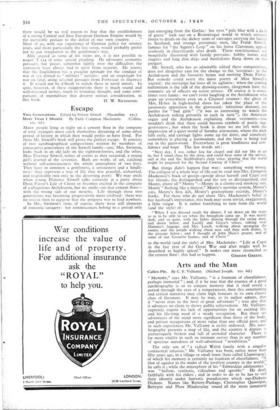The Blue-Water School
UNDER the title Sea Power the writer revives a very old and no less vital problem, a problem partly political and partly strategical. " What really determines the policy of this country," said Sir Edward Grey in 1911, " is the question of Sea Power." Should Britain stand aside from the quarrels of the Continent, and if she must intervene, in what shape should she make her contribution to the common cause? These were questions that confronted Queen Elizabeth, were the subjects of debate in the Parliaments of William III, Queen Anne and George H, and of two outstandingly important pamphlets—Swift's Conduct of the Allies and the less known Considerations of the Present German War, by Mauduit in 1760. In all those great wars of coalitions the decision depended upon which body could achieve superiority in the military field. The British statesman had to decide in what manner the resources and fighting strength of the country could most effectively he applied in order to produce that condition. As a balance may be made to tip the desired way either by adding weight to one scale or taking it from the other, so they had the choice between strengthening the allied armies in the main theatre and weakening those of the enemy. The former called for troops on the Continent, the latter offered a choice of military diversions to draw away enemy strength from the decisive point and depriving the enemy of his financial strength, drawn from trade, and of the materials, raw and manufactured, needed to equip his army and navy. Controversies between these " Continental " and "Maritime schools of thought have been as continuous as they are natural. T 124 is as convinced a supporter of the latter as ever was John Hawkins, Dean Swift or Hardwicke. He argues that there is no need for Great Britain to become embroiled in the European struggles. The "Low Country policy " was based on fears that experience showed to be groundless—did not England survive though Napoleon held Holland, Belgium and the ports of all of France? He attaches no importance to the views of those who, like Castlereagh, had gone through that struggle and, in spite of the successful issue, still regarded it as essential that there should be no naval establishments in the Scheldt or- at Antwerp. He sees no danger in the domination of Europe by a single Power the old argument that a Power in that position would be able to outbuild Britain at sea, and take the command of the sea from her, he dismisses: Napoleon was in such a situation after Tilsit and did not do it ; why should we think that Herr Hitler would? " One thing about which we can be reasonably certain is that
there would be no real reason to fear that the establishment of a strong Central and East European German Empire would be the inevitable prelude to the defeat of our own country. . . ." Most of us, with our experience of German policy for seventy years, and more particularly the last seven, would probably prefer not to put temptation in the gentleman's way.
Ably argued as some of his views are, it is not possible to acquit T 124 of some special pleading. He advocates economic pressure, but passes somewhat lightly over the difficulties the statesmen have always had to meet from neutrals. He asserts that the Englishman has a peculiar aptitude for the conduct of war at sea denied to " military " nations: and an ineptitude for war on land, using selected passages from Fortescue to illustrate it. It would not be difficult to match those in naval annals. In spite, however, of these exaggerations there is much sound and well-reasoned matter, much to stimulate thought, and some com- parisons of expenditure that deserve serious consideration, in this book.
H: W. RICHMOND.



























 Previous page
Previous page